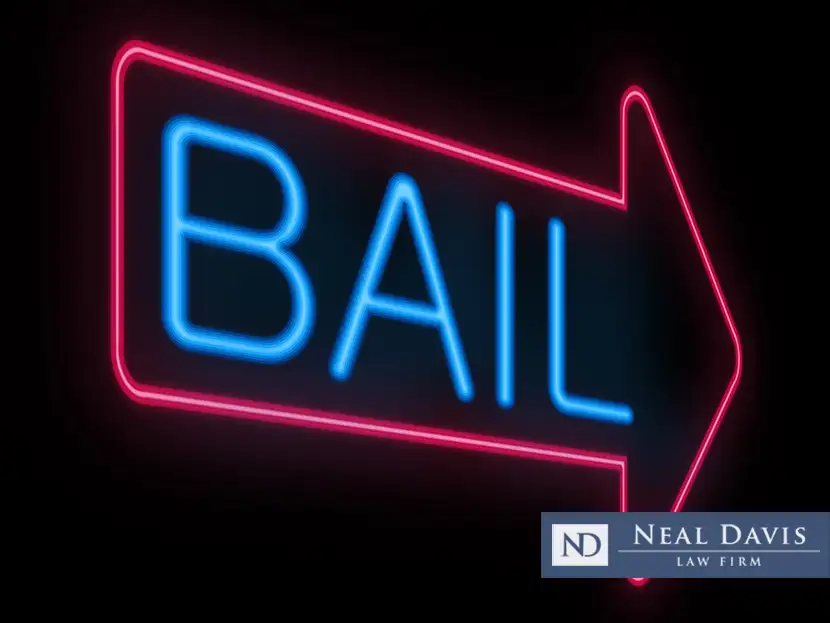How much is bail or bond to get out of jail in Harris County? Who is eligible?
The amount of bail or bond required varies significantly based on the specific charges and the severity of the alleged crime.
Factors such as the individual’s criminal history, the risk of flight, and potential danger to the community can influence bail eligibility.
In other words:
- Have you had past trouble with the law?
- Is there a chance you’ll run away?
- Will you be a danger to others if you are out of jail?
But first, know this: Posting bail or bond for pretrial freedom is a common practice in the United States but is extremely rare throughout the rest of the world.
One major reason for this is our judicial system’s presumption of innocence until proven guilty. A potentially innocent person should not have to remain in jail while awaiting trial unnecessarily.
Persons charged with a crime must know if they are eligible for bail or bond and, if so, how much their bail or bond costs. Defense attorney Neal Davis provides answers to these questions below.
When your reputation and livelihood are at stake, trust only the best.
Build a strong defense. Talk to Neal Davis.
What is bail?
Bail is a process by which a court sets a dollar amount, or bail, which a defendant must pay in order to be released from jail pending court hearings on their case.
The bail amount is set by the court, or judge, and may include certain conditions to remain in effect.
After such conditional release from custody for arrested defendants facing a criminal charge, their bail money can be refunded when the person shows up for every ordered court appearance, or if their case is dismissed. (Court costs, fees and penalties may be deducted.)
The chief purpose of courts setting bail is to ensure that defendants will return to court for trial.
If they fail to do so, they lose their bail money, their bond money or their collateral, and they can be returned to custody.
Can my attorney get bail reduced?
Yes. You have the right to request a bail reduction when your bail is set.
A bail hearing is then held, at which your defense lawyer can argue that you’re not a flight risk and will appear at trial.
As for what factors might help in establishing that you’re not a flight risk, these include whether you live in Texas and have a job in Texas that supports your family. It also helps if you do not have a criminal history and can afford only a lower bond.
Also, keep in mind that after your bail is set upon such a hearing, additional requirements may be made in order for you to continue to be free prior to trial.
If you fail to meet these conditions, you may be subject to arrest and forfeiture of your bail amount. In other words, posting bail is not a free pass to remain out of custody prior to your trial. If you violate any conditions of your bail, your bail can be revoked and you can be returned to custody.
Your defense attorney may be able to negotiate your release with prosecutors by having a charge reduced or even dropped.
If the charge remains, your defense lawyer at least may be able to get your bail reduced. And if you go to trial, a skilled criminal defense lawyer can fight for your case.
I can’t pay my bail. What can I do?
You’ll be looking at a “jail bond”.
What if a defendant cannot afford to pay their bail and cannot get a friend or family member to pay it? For such defendants who lack the funds to post bail, a jail bond is an alternative.
What is a jail bond? In order to be released from jail, the defendant can engage a bail bondsman or a bail bond company to provide a surety bond with the court. This means the bond company or bondsman pledges money as a promise that the defendant will return to court later for trial.
Typically, the bonding company charges a defendant a non-refundable 10 percent fee of the total bond for the service.
Under this type of bond, the defendant may pay some money while providing the bondsman or bond company with a claim to collateral (possessions of value) for the rest of the loan. Such collateral could be a car or a house.
The bondsman then pays the court a designated portion of the bond and pledges to pay the full amount if the defendant fails to appear later in court. If the defendant fails to appear, they would forfeit their collateral to the bondsman to cover the full amount.
Additionally, in the event that a defendant fails to appear in court or otherwise fails to heed bond conditions, the bond is revoked. The bonding company may hire a bounty hunter to find the defendant and surrender them to the court. A defendant could then be returned to jail to await trial.
What’s the difference between bail and bond?
| Bail | Bond |
|---|---|
| The amount of money set by the court that an individual must pay to be released from jail while awaiting their trial. A bail is a financial guarantee that the defendant will appear in court as required. If the defendant appears in court as scheduled, the bail amount is typically refunded, regardless of the case’s outcome. If the defendant fails to appear, the court may forfeit the bail, keeping the money and issuing a warrant for the defendant’s arrest. | A bond is a type of bail. It is a guarantee paid by a third party, often a bail bond company, on behalf of the defendant. When a defendant cannot afford the full bail amount, they might find a bail bond company to post a bond. The defendant usually pays the bail bond company a non-refundable fee, typically around 10% of the total bail amount. The company then provides a bond to the court, promising to pay the full bail amount if the defendant fails to appear in court. If the defendant does not appear in court, the bail bond company is responsible for paying the court the full amount and may seek repayment from the defendant or any co-signers. |
Can I bail myself out of jail?
When the court allows it, defendants alone can post bail, thus bailing themselves out of jail without sureties or other security such as a bondsman. This is called a personal recognizance bond, which is a pledge to pay further if the defendant fails to appear at trial.
When a defendant posts bail but fails to appear at trial, the bail amount is forfeited and normally is distributed to law enforcement agencies or the courts, depending on regulations.
Can others help bail me out of Harris County jail?
Virtually anyone who is willing to put up money or collateral to post someone’s bond can do so. When a defendant cannot afford to post his or her own bail, they can ask a family member or a friend to do so.
Is bond or bail the only way to be released?
The answer is no. A skilled criminal defense attorney may negotiate to have a charge dismissed, with no need for a trial or further incarceration.
A defense lawyer also may be able to negotiate a plea deal, by which the defendant receives a lesser charge and perhaps a lesser punishment by pleading guilty and avoiding a trial.
How high can bond be set in Texas?
As for how high bond can be set in Texas, that depends on the court, the charge and the crime.
Every court in Texas, including Harris County District Courts, has a bond “schedule” that guides judges on the amount of bail or bond for various crimes. This schedule is not a time frame but, instead, a list of the dollar amounts that can be set for bond, depending on the criminal charge.
However, judges and magistrates are free to adjust such amounts depending on the nature of the case.
The severity of a charge is among the chief factors in determining a bail amount. Other things which are taken into account when setting bail include:
- If a defendant might be a risk to society
- If a defendant was already out on bail when arrested
- If a defendant has previous criminal convictions
- If a defendant was on probation because of another criminal conviction
- If a defendant is considered to be a flight risk
Regardless of the amount of bail, it does not have to be posted in the form of cash in federal court. A federal court may accept credit cards or collateral, such as real estate. That was the case in New York federal court when Bankman-Fried’s parents used their home’s equity for collateral.
Federal bail amounts are returned if and when a defendant appears in court for trial. Surety bonds to bonding companies are NOT returned in state court.
What if bail amounts are too high?
With some exceptions, bail amounts are not excessively high or oppressive. But sometimes they are.
Why? The severity of a crime and whether the defendant has a previous conviction may motivate a judge to impose a particularly high bail amount–perhaps even an excessive amount.
Depending on the individual case, not all bond amounts or bond conditions are fair to defendants.
If you or a loved one face such a circumstance, veteran Houston criminal defense attorney Neal Davis has a track record of successfully reducing bonds or changing bond conditions.
Davis has successfully appealed trial courts that have refused to follow the law and have failed to set reasonable bonds and conditions.

Am I eligible for bail or bond?
As for who is eligible for bail or bond, that depends on the individual’s circumstances. But many defendants are, in fact, eligible for bail or bond. In fact, with few exceptions, the Texas Constitution provides prisoners with a right to bail before trial.
In the Houston area, Harris County District Courts set a bond “schedule” depending on the crime that is charged. That schedule is not a time frame but rather a list of dollar amounts which can be set for bond, depending on the criminal charge.
The Harris County bond schedule has been challenged as being unfair and oppressive and has gained some reforms. One bond reform in Harris County has provided that many people who were accused of minor crimes can be released without paying cash bail.
According to the Texas Tribune, thousands of persons who’d been accused of misdemeanor crimes not involving domestic abuse, and not having previous bond violations, have been freed in Harris County without cost while awaiting trial.
Texas law allows some pre-appeal releases
Whether a person can post bail and be released from jail while awaiting an appeal depends on the state’s laws and often the severity of the crime.
For example, in cases involving serious crimes like rape or murder, it is unlikely that a convicted person would be granted bail or released on bond (a bail bondsman’s guarantee to cover the bail) in any state while an appeal is pending.
New Texas law limits bail for violent offenders
A new Texas law, signed by Governor Greg Abbott in Houston on Monday, Sept. 13, 2021, aims to detain certain individuals with prior criminal records in jail, even if they haven’t yet had a court hearing for their new charge and are legally presumed innocent until proven guilty. This law took effect on December 2, 2021.
Under Texas law, many persons may be granted release on bond pending their appeal. But that doesn’t always happen.
Texas Code of Criminal Procedure Article 44.04(b) allows a convicted person to be released on bond pending their appeal when their sentence is under 10 years in prison and when the offense is not what’s known as a 3G offense, or an offense more serious than most (the term derives from letters in certain pertinent parts of the code).
In Texas, such 3G offenses which would preclude release on bail or bond pending an appeal include: murder, capital murder, sexual assault, aggravated sexual assault, indecency with a child, trafficking of persons, aggravated robbery, compelling prostitution and sexual performance of a child – among other crimes.
But even if a person did not commit such a serious crime and qualifies for bond prior to appeal, a judge in Texas has the discretion to approve or deny it.
To deny it, a judge might believe the defendant would not show up if the appeal was lost, or the judge might believe that the defendant might commit another crime in the interim, given his or her criminal history.
It’s possible to also appeal a judge’s decision to deny release on bail pending an original appeal. But this rarely succeeds.
What are bond amounts?
As for how the bail amount is decided, that depends on the nature of the crime and the bond schedule of the courts.
In case you’re wondering how much money can be set for a bond, first, be aware of an extreme case: Cryptocurrency entrepreneur Sam Bankman-Fried was released from federal custody on December 22, 2022, only after his parents agreed to sign a $250 million bond and also pledged to keep their son at their California home while he awaits trial on financial crimes.
The $250 million bond is believed to be the largest federal pretrial bond ever set, according to Assistant U.S. Attorney Nicolas Roos, reports CBS News.
In terms of the nature of the crime, Texas criminal charges can involve capital felonies (or murders, the most serious charge), first-degree felonies, second-degree felonies, third-degree felonies and fourth-degree or “state jail” felonies (the least serious). That is set forth by Texas Penal Code § 12.04.
In Harris County, bonds for felonies can range from $2,000 for some fourth-degree felonies to $50,000 for some murders.
For felony DWI (driving while intoxicated), defendants with a previous felony DWI conviction face double the bond amount for each previous felony DWI conviction. If the defendant had one previous felony DWI conviction, that would mean a $20,000 bond, or double the $10,000 bond amount normally set by Harris County District Courts for a felony DWI.
For all capital felonies and for some habitual or repeat offenders, Harris County District Courts set no bond, which means such defendants are not eligible for bond.
Can you object to a bond amount or bond condition?
As for whether you can object to a bond amount or bond condition – yes, you can. Houston criminal defense lawyer Neal Davis has done that successfully in many cases.
Defendants who object to the amount of bond or a bond condition must state this objection in court, usually in the form of a motion or pre-trial application for writ of habeas corpus. The defendant, or his or her legal counsel, then must demonstrate that the court abused its discretion by imposing an excessive bond amount or bond condition.
Even in cases for which courts have discretion in setting bond amounts, they still cannot set overly excessive bonds. For capital murder cases, the Texas Court of Criminal Appeals never has allowed a bond amount approaching $1 million. In one such case, a bond set at $1 million was reduced to $50,000 by the appeals court.
How long does it typically take from arrest to bail?
If you’re wondering how long it takes to get out of Harris County jail after posting a bail bond, the time to bail out of jail can depend on a variety of factors. These include whether the defendant can post bail himself or needs to find and engage a bail bondsman.
Usually, after bail is posted, the defendant can be released from jail within a few hours. In fact, booking and bail in Texas often can be completed in two to three hours, provided there is a pre-set bail amount for the offense involved.
What are bond conditions?
To a limited extent, courts can impose bond conditions, as with a felony appeal. These conditions can directly or indirectly relate to ensuring that the defendant continues to appear in court.
For instance, as a bond condition a court may require that a DWI defendant install a motor vehicle ignition interlock system in his or her vehicle and not be allowed to operate a motor vehicle without using such a device. (These devices note excessive blood alcohol content in order to prevent an engine from being started by a drunk driver.)
Or, for a defendant on pretrial release or appealing a conviction of aggravated assault, a court may impose a bond condition that the defendant stays away from and does not communicate with the alleged victim.
A trial court has the discretion to revoke bond or bail if it finds enough evidence that a valid bond condition has been violated. Thus, meeting bond conditions is very important.
Think your bail can’t be revoked? Think again.
Under Texas law, bail can be revoked by a judge for failing to follow bond conditions, including appearing when you’re supposed to. Bail also can be revoked if you get arrested again during your bail period.
Just bailed out of Harris County jail? Feeling lost and overwhelmed?
The stress and uncertainty of facing criminal charges are crushing.
Tell us what’s going on, and we’ll get to work.


